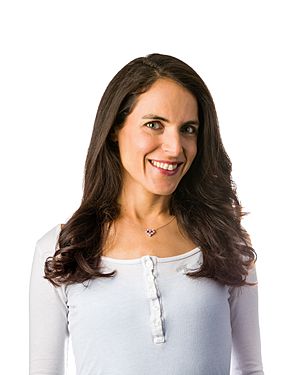Yael Tauman Kalai facts for kids
Quick facts for kids
Yael Tauman Kalai
|
|
|---|---|
| יעל טאומן קלעי | |
 |
|
| Born | |
| Alma mater | Harvard University (BS) University of Cambridge (mEng) Massachusetts Institute of Technology (PhD) |
| Known for | Ring Signatures, the insecurity of the Fiat–Shamir heuristic, delegating computation |
| Awards |
|
| Scientific career | |
| Fields | Cryptography, Computer Science |
| Institutions | Stanford University Princeton University |
| Doctoral advisor | Shafi Goldwasser |
| Doctoral students | Elette Boyle |
Yael Tauman Kalai (Hebrew: יעל טאומן קלעי) is a brilliant computer scientist. She is an expert in cryptography, which is the science of making and breaking secret codes. She also studies theoretical computer science, which is about the basic ideas behind how computers work.
Yael Tauman Kalai is a professor at MIT, a very famous university. She works in their Computer Science and Artificial Intelligence Lab. Before joining MIT, she was a top researcher at Microsoft Research New England.
Contents
Becoming a Computer Scientist
Yael Tauman Kalai started her journey in computer science in Israel. She finished her first degree at the Hebrew University of Jerusalem in 1997.
Advanced Studies
She then went to the Weizmann Institute of Science. There, she earned her master's degree in 2001. She worked with a very famous scientist named Adi Shamir. After that, Yael moved to the MIT in the United States. She completed her PhD in 2006. Her teacher and guide for her PhD was Shafi Goldwasser, who is also a very important computer scientist.
Working in Research
After getting her PhD, Yael continued her research. She worked at Microsoft Research and also at the Weizmann Institute again. Later, she became a professor at the Georgia Institute of Technology. In 2008, she took a permanent job at Microsoft Research. She also helps guide the Institute for Computational and Experimental Research in Mathematics (ICERM).
Amazing Discoveries
Yael Tauman Kalai has made many important discoveries in computer science. Her work helps make our digital world safer and more efficient.
Ring Signatures
One of her big inventions is called "ring signatures." Imagine you want to send a message, but you don't want people to know exactly who sent it. Ring signatures let a group of people sign a message, but no one can tell which person in the group actually signed it. This technology is used in digital money systems like Monero (cryptocurrency).
Making Computations Safe
Yael also showed a problem with a common method used in cryptography called the Fiat–Shamir heuristic. She worked with her former teacher, Shafi Goldwasser, to show how this method could sometimes be unsafe. Her research helps make sure that computer calculations are done correctly and securely. This is very important for things like cloud computing, where you use computers over the internet to store and process information.
Awards and Recognition
Yael Tauman Kalai's important work has been recognized by many groups.
Speaking at Conferences
In 2018, she was invited to speak at the International Congress of Mathematicians. This is a huge event where top mathematicians from all over the world share their ideas. She spoke about how math is used in computer science.
Special Awards
Her master's thesis, which introduced ring signatures, won an award for being outstanding. Her PhD paper at MIT also won a special award called the George M. Sprowls Award. This award is given for excellent PhD papers in computer science.
In 2017, she helped lead a big meeting called the Theory of Cryptography Conference. In 2022, she received the ACM Prize in Computing. This is a very important award in computer science. She won it for her amazing work on making sure computer calculations are done correctly and for her other big contributions to cryptography.
About Her Family
Yael Tauman Kalai's father is Yair Tauman, who is a famous expert in game theory. Game theory is a field that studies how people make decisions when they interact with each other. Her husband, Adam Tauman Kalai, also works in computer science at a company called OpenAI.
 | Janet Taylor Pickett |
 | Synthia Saint James |
 | Howardena Pindell |
 | Faith Ringgold |

